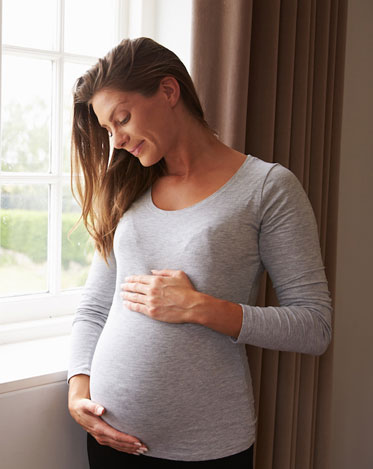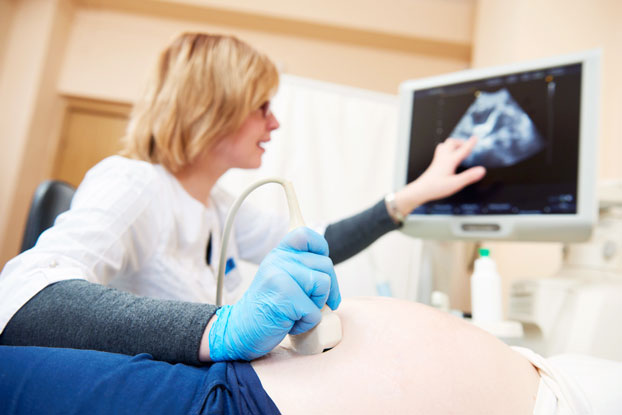Advanced Maternal Age. Geriatric pregnancy. Elderly primigravida. None of these phrases are particularly endearing, but they are all terms used to describe a pregnancy in a woman in her mid-30s and beyond. Of course, women in their 30s and 40s are not old, but the female reproductive system evolved so that women are most fertile in the teens and 20s, and it’s a fact of biology that childbearing pregnancy becomes more complicated with age. This is particularly true for women aged 35 and older, and the medical community uses the term “advanced maternal age” to indicate women who are pregnant or want to become pregnant and may need to consider the risks associated with having a child later in life.
 How Does Age Affect Pregnancy?
How Does Age Affect Pregnancy?
A woman is born with all the eggs she will ever produce and those cells age along with the rest of her body. By the time a woman enters her 30s her eggs have become more difficult to fertilize and some, over time, are damaged. This resistance to fertilization can delay or impede conception and the possible damage to the egg cells increases the rate of possible birth defects. Furthermore, pregnancy stresses the body, and women who conceive at a later age are more susceptible to having a high-risk pregnancy.
Women who are considered being of “advanced maternal age” may not struggle with pregnancy and it is still absolutely possible for women in this age bracket to have healthy pregnancies. Nevertheless, when considering having children after the age of 35, it is wise to understand the realities of pregnancy later in life and to know what to expect throughout the whole process, from pre-conception to delivery.
Fertility Rates in Women Over Age 35
Women are most fertile in their early 20s and fertility rates decline with age, dropping sharply in the late 30s. By the age of 35, doctors recommend couples trying to conceive allow for six months to one year to become pregnant. If pregnancy has not happened after that length of time, it may be necessary to consult a fertility specialist.
Many factors other than age can contribute to infertility, including advanced paternal age, medical conditions, issues with sperm production, or genetic disorders. There are a variety of options for people hoping to conceive, depending on the underlying reason for the infertility. These options may include fertility medications, surgery, In Vitro Fertilization (IVF), egg or sperm donation, and insemination.
Unfortunately, fertility rates continue to decline with age and after 40 it is considerably harder to conceive even with measures like IVF, so doctors recommend that women seeking to become pregnant consider fertility treatments earlier rather than later.
Pregnancy Risk Factors After Age 35
Women aged 35 or older are more prone to experiencing complications in pregnancy and have higher incidences of high risk pregnancies. Many risk factors can be reduced if the woman is healthy and receiving proper prenatal care, but the risks continue to rise as the age of the mother increases. Risk factors for pregnancies in advanced age include:
- Multiple births (twins)
- More likely to require a C-section
- Increased rates of gestational diabetes and high blood pressure (hypertension)
- A higher percentage of miscarriage and stillbirths
- A greater chance of giving birth prematurely
- Babies born with low birth weight
- Raised rates of obstetric complication such as placenta praevia
- Increased rates of chromosomal abnormalities such as Down Syndrome
Some complications of high-risk pregnancies can be treated in advance of the birth. Genetic testing, aneuploidy screening and fetal surveillance are tools doctors can use to help women understand potential complications so they can have the healthiest and safest pregnancies possible.
How to Have a Healthy Pregnancy at Advanced Maternal Age
The best thing a woman can do to increase her chances of having a healthy pregnancy at an advanced maternal age is the same for any woman wanting to have a healthy baby. Women who exercise regularly, eat a healthy diet, and avoid tobacco products, illegal drugs, and alcohol consumption put themselves in the best position possible to conceive and have a healthy pregnancy.
Women who are older and want to have a child are advised to make a pre-conception appointment with their care providers so they can better understand their individual medical situations and what they can do to minimize their risks. Doctors also recommend that women who get pregnant at an advanced age seriously consider screening for genetic and chromosomal abnormalities.
Preparing for Pregnancy at Advanced Maternal Age
More women than ever are waiting to have children until they are older and feel better prepared to be a parent. The ability to choose when to have a child is crucial to many women’s senses of happiness and self-determination; however, while people may think differently about age than they did a generation ago it is still true that humans are at the mercy of our biology. Pre-conception appointments, regular prenatal care, and maintaining a healthy lifestyle can increase the chances for women of advanced maternal age for conceiving and having happy, healthy pregnancies.
If you are over age 35 and expecting a child or trying to get pregnant, please contact the obstetricians at Kansas City ObGyn today at This email address is being protected from spambots. You need JavaScript enabled to view it. or 913-948-9636 to discuss your pregnancy, birth and postpartum plan for advanced maternal age.






